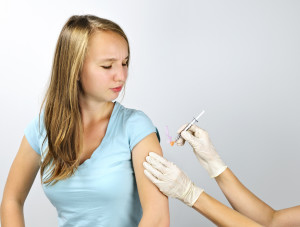Everything You Need to Know about the HPV Vaccine
 The human papillomavirus (HPV) is a group of more than 150 related viruses newly infecting approximately 14 million people each year. It is estimated that about 79 million Americans are currently infected with HPV. With numbers this staggering, it is important to understand the risks associated with HPV, and how to keep you and your children safe from infection. The HPV vaccine has been proven to protect young people from the virus’ risks and side effects, however as with all preventive treatments, parents should be thoroughly informed about the vaccine and its risks before choosing to vaccinate their children. Read on for everything you need to know about the HPV vaccine.
The human papillomavirus (HPV) is a group of more than 150 related viruses newly infecting approximately 14 million people each year. It is estimated that about 79 million Americans are currently infected with HPV. With numbers this staggering, it is important to understand the risks associated with HPV, and how to keep you and your children safe from infection. The HPV vaccine has been proven to protect young people from the virus’ risks and side effects, however as with all preventive treatments, parents should be thoroughly informed about the vaccine and its risks before choosing to vaccinate their children. Read on for everything you need to know about the HPV vaccine.
Contracting HPV
HPV is transmitted through skin-to-skin sexual contact, making it the most common sexually transmitted infection. In rare cases, pregnant women can pass HPV to their babies during delivery. In these cases, the baby is at risk of developing recurrent respiratory papillomatosis (RRP), a condition where warts grow in the throat.
HPV Symptoms
Many who contract HPV never demonstrate symptoms—making it easier for them to transmit the disease unknowingly. 90 percent of HPV infections go away on their own within two years. Still, those diagnosed with the virus are at risk of developing genital warts, and in the most severe cases, cancer, including cervical, vaginal, vulvar, penile, anal, and throat cancer. The HPV vaccine protects against the development of HPV-related symptoms, as well as cancers.
Who Should Receive the Vaccine
The best time to administer the vaccine, for optimal effectiveness, is around ages 11 and 12 before boys and girls are sexually active. The vaccine also produces a more effective immune response when administered to preteens, making it even more important to vaccinate your children before they become teenagers.
Young adults who did not receive the vaccine before age 12 can still be effectively vaccinated, even if they have already had sex. Young women can be vaccinated up to age 26, and young men can be vaccinated up to age 21. Young men who have sex with other men or who have weakened immune systems, including those who are HIV positive, can be vaccinated up to age 26.
Vaccine Administration
The vaccine is administered in three shots. The second must be given one to two months after the first, and the third must be given six months after the first. Individuals who wait longer than is recommended between shots are still encouraged to finish the series. There is no need to restart the shot series for best results. Research shows that those who receive the entire series are protected for a period of 8-10 years.
Vaccine Effectiveness
Clinical trials have shown that the vaccine provides almost 100 percent protection against precancers and genital warts. In addition, since 2006 when the vaccine became recommended for preteens, researchers have identified a 56 percent decrease in vaccine type HPV infections among young women in the United States, and that overall rates of reported genital wart cases are decreasing as well.
Vaccine Safety
The safety and effectiveness of the HPV vaccine continues to be monitored by the Centers for Disease Control and Prevention (CDC) and the Food and Drug Administration (FDA). To date, no serious health risks have been associated with the vaccine. As with all vaccines, there have been reported side effects. These include pain and redness at the injection site, dizziness, fever, fatigue, muscle or joint pain, and nausea. Some also report brief fainting spells, as may occur after any procedure or vaccination. Severe allergic reactions are rare. Those who are allergic to any of the vaccine components should not receive the vaccine.
For more information on the risks related to HPV, and how vaccination can protect you and your children, speak with your OBGYN today.
More